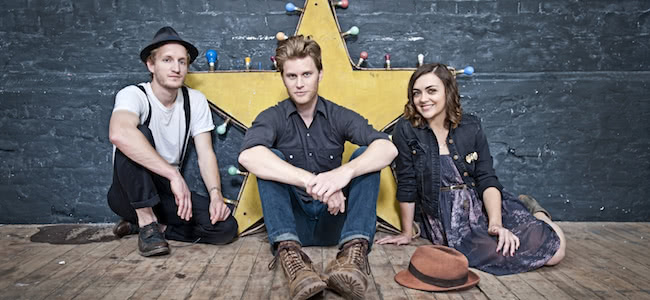As the venue filled to capacity, Triple J darlings The Falls (namely Melinda Kirwin and Simon Rudston-Brown) took to the stage, beginning their set with the soft but well-composed “Please”. An indication of what was to come for the duo’s set, “Please” showcased the simple melodies that typify their sound.
“Girl That I Love” made it clear that the ex-couple don’t need bells and whistles to present a quality bunch of songs; Rudston-Brown’s confident guitar and timeless vocals accompanied by Kirwin on the melodica are enough.
Doing most of the talking for the duo, Kirwin had a curious stage presence, and prefaced “Home” by somewhat awkwardly commenting that it was probably their only track that most of the crowd knew.
Once they kicked off the song however, the music did the talking and carried its light-hearted and folky vibe through the space, with most singing along.
A definite highlight was a cover of Neil Young’s “Heart of Gold”. Listing the songwriter and artist as one of their idols, The Falls undoubtedly did him justice, and the track quickly turned into a sing-along as the audience grew livelier in anticipation of the main act.
After the crowd had grown increasingly restless during what seemed like an unnecessary wait, The Lumineers finally took to the stage.
Following a bizarre soundscape introduction that seemed more suited to a punk group, Wesley Schultz, Neyla Pekarek, Jeremiah Fraites, Stelth Ulvang, and Ben Wahamaki leapt into “Submarines”, the perfect opening number to showcase frontman Schultz’s indie/folk vocal skills.
Joining the rest of the group in a single line at the front of the stage, Fraites descended from his drum kit to play tambourine for “Flowers in Your Hair”. A bass drum positioned downstage allowed him to engage with the audience along with the rest of the group, traditionally a difficult task for a drummer.
The general impression given by The Lumineers is that their rapid success wasn’t an ego boost, but quite the opposite; they seem humbled and truly grateful to be given the chance to share their music with the newly-acquired masses of fans. Attesting to this, “Ho Hey”, undoubtedly their most popular track, came fourth.
Naturally, as soon as they issued their first folky “Ho!” the crowd went crazy, and the energy in the venue was tangible.
With a vibe that was almost spiritual on the long, drawn out notes of the second bridge, it’s easy to see why “Ho Hey” was the track that launched The Lumineers into the spotlight – inevitably, people love songs they can sing along to.
“Dead Sea” was followed by a cover of Bob Dylan’s “Subterranean Homesick Blues” and, despite being previously compared to Dylan’s unmistakeable sound, they made the number their own. Ulvang in particular had fun, playing keyboard with one hand and maraca with the other.
An unnamed song opened with cellist Pekarek taking the lead on vocals, which was greeted with overwhelming positivity from the supportive patrons.
Applause for the song turned into 1,200 pairs of hands clapping in time for the start of “Charlie Boy”, for which Fraites demonstrated extreme versatility, switching from drums to mandolin.
“Stubborn Love” was a faultless inclusion, and apparently one that many had been waiting all night to hear.
As instructed by Schultz, the crowd belted the lyrics, all voices combined to form an uplifting racket. Finishing on a high, “Big Parade” proceeded to maintain the frenzied energy levels.
Opening with Ulvang standing on his chair to encourage clapping, and containing a half-minute long freeze in the middle, the bluesy track was a proper hoedown.
Despite their rapid rise to success, The Lumineers manage to retain the feel of a small-town band; with Fraites’ signature suspenders, Schultz’s battered hat, and Pekarek’s faded leather boots, it’s easy to picture them in a tiny venue in their base in Colorado.
Fraites proceeded to play a sweet xylophone intro to “Flapper Girl”, which slightly lowered the mood and seemed a strange choice as a concluding number. After a solid two minutes of rowdy applause, Schultz returned to the stage to play a beautiful rendition of “Morning Song”, which he seemed thoroughly engaged with on an emotional level.
Rapturous applause ensued when Schultz announced that they were going to venture into the crowd to play a tune; the five assembled in an outward-facing circle, hushing the entire audience as everyone soaked in the acoustic, off-mic song.
Highlighting the pleasantly strained tone of Schultz and Pekarek’s voices in particular, it was a surprising and special inclusion.
Returning to the stage to cap-off their generous encore, a cover of The Violent Femmes’ “American Music” restored energy levels to maximum and made it clear to all why The Lumineers are so likeable. They don’t attempt to do anything terribly revolutionary, they stick to what they know and they do it extremely well.




































